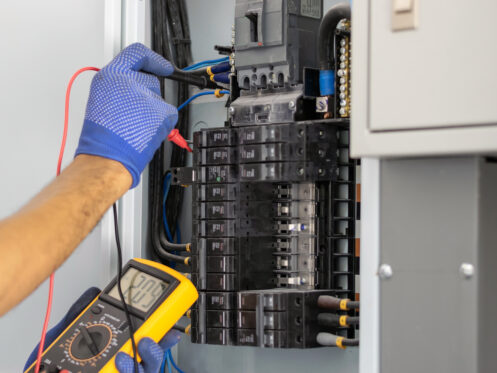An electrical panel inspection is a necessary part of maintaining a home. A qualified electrician can identify potential safety issues ranging from an outdated panel to wiring problems. Likewise, an inspection helps determine whether your house can support the electrical demands of your lifestyle. Homeowners need to know when to schedule an electrical panel inspection. Several situations warrant a panel inspection by a qualified electrician.
Purchasing a House
Many people make the mistake of relying solely on a general home inspection when buying a house without delving into more specific inspections, such as an electrical panel inspection. While a standard home inspection may identify obvious hazards, it often overlooks critical details about the electrical system’s condition.
A detailed electrical panel inspection provides valuable insights into the system’s state, going beyond the surface to assess wiring, breakers, bus bars, and grounding. Bus bars are conductive metal strips or bars inside the electrical panel that distribute electrical power to various circuits. They are crucial for managing and directing the electrical flow throughout your home. Ensuring these are in good condition is vital for your electrical system’s safety and efficiency.
A detailed panel inspection is also crucial because a safe panel does not always guarantee meeting your needs. For instance, if you plan to install a more powerful HVAC system or convenience like a dishwasher, you must ensure the electrical panel can handle the increased load.
An electrical panel inspection can also reveal safety concerns and the panel’s age. Corrosion, a common issue, can significantly impact the panel’s functionality and safety. The inspection will help you understand the extent of corrosion and estimate how long the panel will remain functional before requiring replacement. This information is essential for making an informed bid on a house and avoiding unexpected costs.
Installing a Major Appliance
A handful of large appliances pull the most electricity from your home’s panel. Even if these are highly efficient appliances, they usually draw a lot of juice to initiate each cycle. For example, refrigerators and espresso machines are common culprits for tripping circuit breakers. You should check the peak draw for an appliance before buying it. An electrical inspection report can then compare that draw to the peak available power on the circuit. In many cases, upgrading the breaker and wiring is necessary to install a major appliance.
It is also wise to consider how many appliances are on the same circuit. Even a seemingly simple device like a microwave can use a lot of power. If it’s on the same circuit as an electric oven, the two appliances can simultaneously hit the peak of their power use. An electrical panel inspection will let you know if the two appliances can coexist on the same circuit or if you need to run another one.
The more powerful the new appliance, the more important an electrical panel inspection is. For example, modern appliances like EV charging stations and oversized refrigerators can tax a panel significantly. Ensure your panel is up to the job before shopping for these kinds of appliances.
After Flooding
Water and corrosion can lead to a wide range of electrical problems in a house. An inspection is prudent if any flooding is near the electrical panel. Even if the water level didn’t reach any of the electrical systems, the humidity from the presence of the water can affect it. Humidity and flood water can accelerate corrosion, potentially leading to disconnected or short circuits in the electrical panel. Minimally, these can be annoyances. At the worst, they can be fire hazards.
Following a Nearby Lightning Strike
Lightning can overload your electrical system with more energy than it can handle. However, it doesn’t always render the system inoperable. Instead, the electrical panel could operate in a damaged condition. Lighting can fuse components, damage circuit breakers, melt wires, and lead to many other forms of damage. Any one of these issues is a potential fire hazard for your home.
Also, a lightning bolt doesn’t have to hit your house to trigger problems. If a lightning strike occurs anywhere in your neighborhood, ordering an electrical panel inspection is wise. Due to undiagnosed issues, damage to the local electrical grid can affect your home’s system immediately or over time. An electrical panel inspection will let you know whether there was damage to your home’s system and the nearby grid.
Before a Renovation
Before starting a renovation in your basement or garage, don’t assume that your existing electrical panel can handle the increased demand. Even if the panel is sufficient for general use, the renovation may require additional rewiring or upgrades to accommodate the new electrical load. Scheduling an electrical inspection before you begin will help you assess your panel’s capacity and identify any necessary updates. Planning for expanded electrical needs in advance is far more effective than dealing with problems after the renovation is underway. By addressing these requirements early, you can ensure a smoother renovation process and avoid potential issues with your electrical system later.
An Aging Electrical Panel
Even high-quality electrical panels have a finite lifespan. As panels age, various issues can arise. Corrosion may develop due to the internal stresses of electricity and heat. Small vibrations over time can cause circuit breakers and wires to become loose. Additionally, the materials used in the panel can degrade, affecting overall performance.
A good rule of thumb is to schedule an electrical panel inspection around the 25-year mark unless an earlier issue warrants an inspection. This assessment will help you understand the extent of corrosion, material degradation, and any loosening of components. It also allows you to determine if the panel’s design is outdated or problematic. For instance, there may have been recalls or design flaws that went unnoticed but could impact the safety and efficiency of your electrical system.
Recurring Electrical Problems
The most common recurring electrical problem in a modern system is a circuit breaker that keeps flipping off. Never assume that the solution is just to pop out the current breaker and add a newer or bigger one. If the wiring and the panel are bad matches for the new circuit breaker, there could be a fire or electrical hazard. Also, the circuit breaker might not be the culprit. If the wiring is failing, that could trip the breaker. An electrical panel inspection is a good starting point for running down this recurring electrical issue.
Changes to Electrical Codes
Local electrical codes will change. Even if your house is grandfathered in, it isn’t a good idea to forgo checking whether your system is still compliant. An electrician can compare your current panel to modern standards and identify potentially beneficial upgrades to make your electrical system safer and more efficient.
Contact the Pros
At Pipe Works Services, we have been serving the residents of Chatham, NJ, and the surrounding areas since 2000. We can help with all your electrical needs, including rewiring, installing generators, and updating electrical panels. Additionally, we install, maintain, and repair heating and cooling systems. Contact us today to schedule an appointment with one of our talented team members for your home’s electrical panel.





